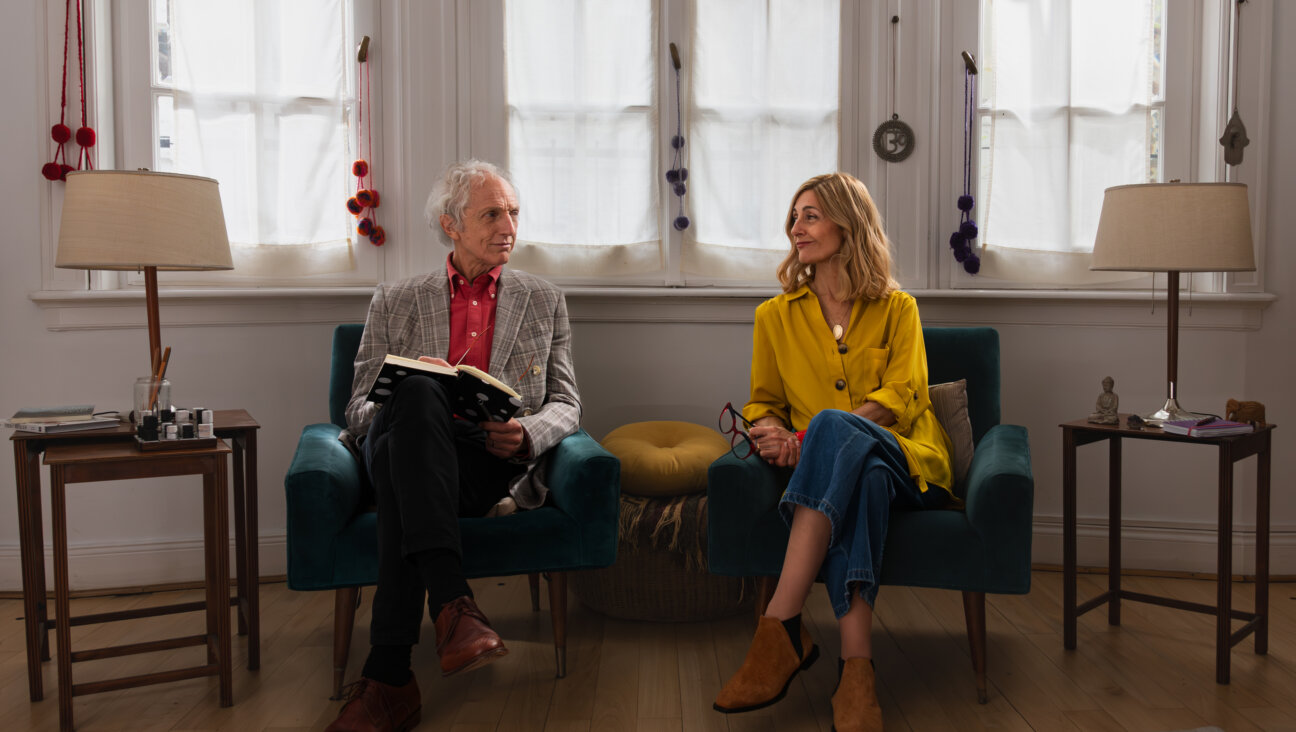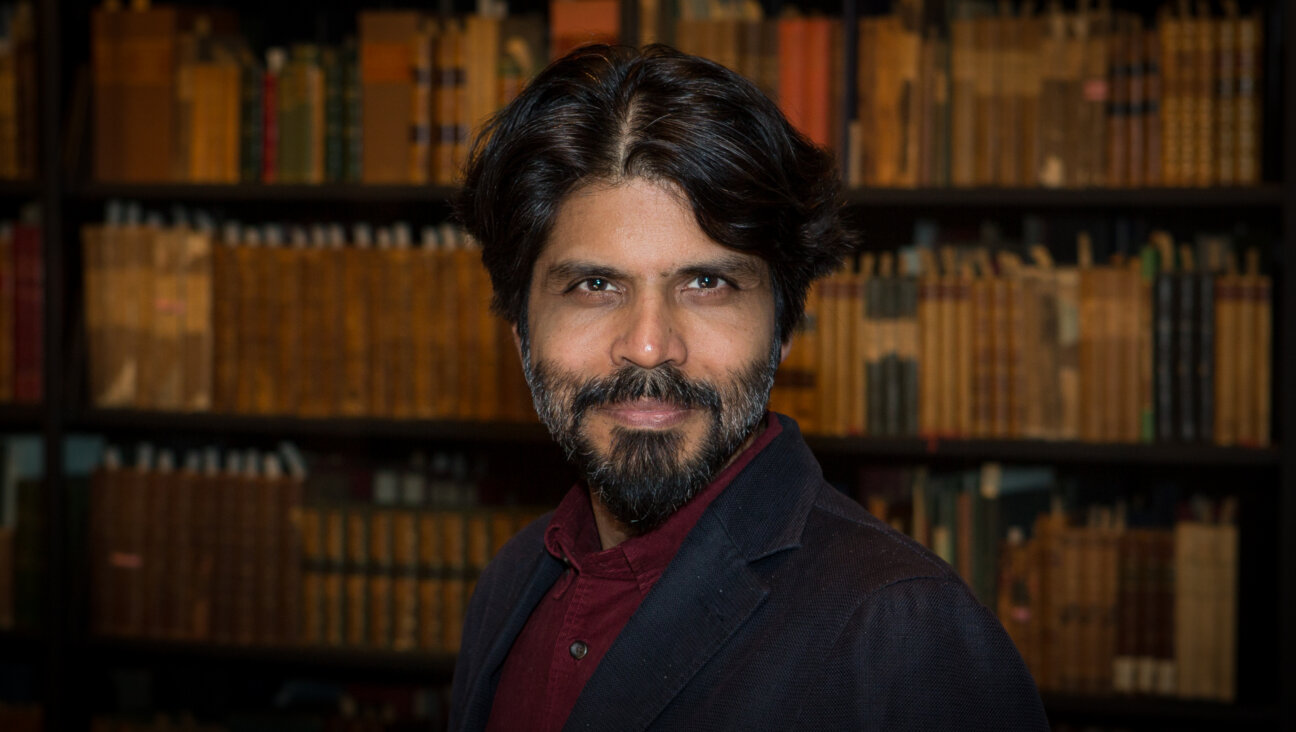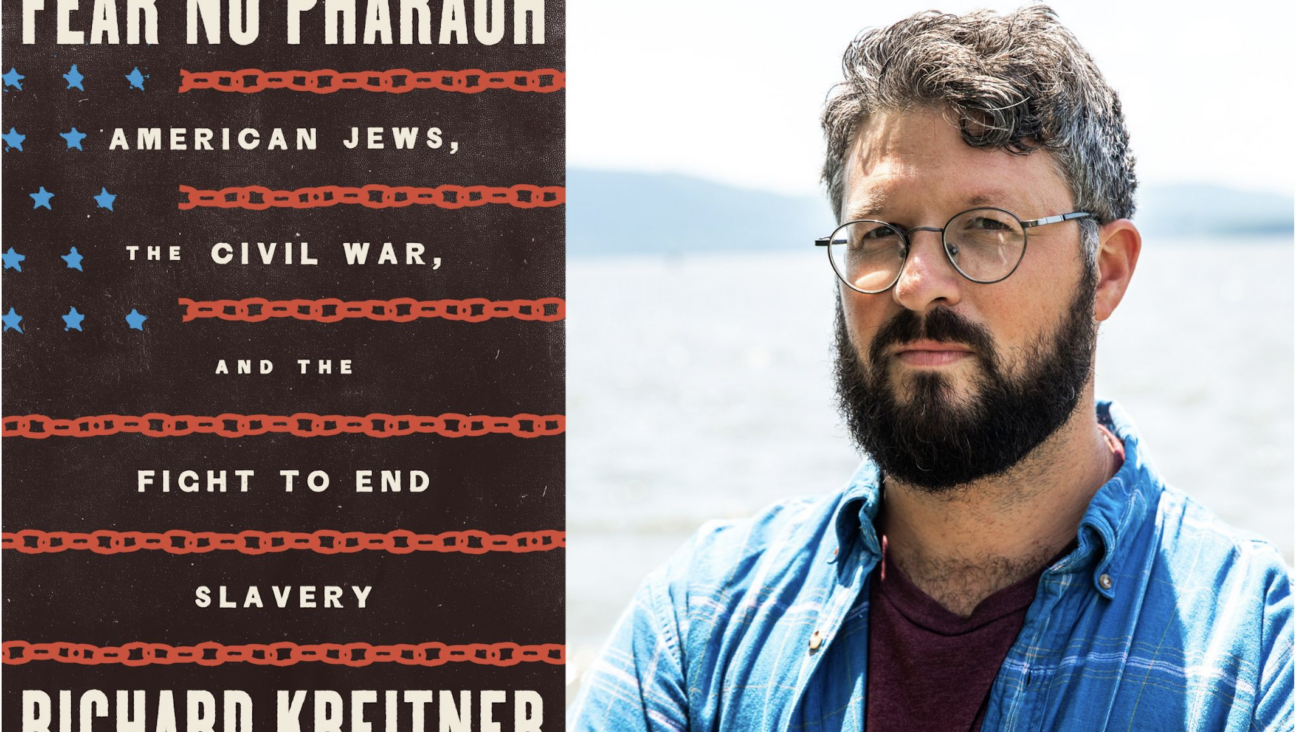The many Jewish lives of Diana Rigg

Diana Rigg Image by Getty Images
The English actress Diana Rigg, who died on September 10 at age 82, was the epitome of graceful allure in the role of Emma Peel in the TV series “The Avengers” and in the James Bond film “On Her Majesty’s Secret Service.” More recently she appeared in “Game of Thrones” in a less alluring, but equally compelling, role.
Rigg’s early charm was described by Crispin Sartwell, great-grandson of the legendary Russian Jewish-born reporter Herman Bernstein: “[Rigg] often wore skin-tight leather jumpsuits à la Catwoman… and she moved around the English countryside with a grace usually reserved for professional dancers…she was an early example of the feisty, self-sufficient, potentially violent heroines who are now a staple of everything from Disney animations to high literature. She met every dilemma with perfect composure and deep wit. And of course Diana Rigg was beautiful, all cheekbones and slim curves.” While fans agree with these encomia, less widely known is the role that Yiddishkeit played in her artistic achievement.
“The Avengers” itself was the brainchild of the producer Sydney Newman, born Sydney Nudelman in Toronto to a family of Russian Jewish immigrants. Whereas Newman saw “The Avengers” as a gritty action drama, the droll wit of Diana Rigg and her costar Patrick Macnee transformed the show’s content.
Born in Yorkshire, Rigg moved to London for dramatic training, and delighted in a social whirl that included many creative Jewish talents. She befriended the English Jewish theater developer Laurie Marsh. In his diary for November 1968, the novelist John Fowles describes Rigg attending a book party for the novelist Thomas Wiseman (born Alphons Weissmann in Vienna to a Jewish family). There Rigg was enthralled, according to Fowles, by the verbal pyrotechnics of Milton Shulman, a Toronto-born Jewish author and drama critic based in the UK.
Fowles was considerably less enchanted by Shulman, accusing him of possessing “that Canadian Jewish love of being outrageous, a little comical, as talk-monopolizing as a Dr. Johnson – his thesis being that individual art has gone forever, that now only community art (the cinema and TV and pop art in general) remains.”
Riggs’ interest in Jewish cultural aspirants reached its apogee in 1973 when she married the Haifa-born artist Menachem Gueffen (1930-2016), a painter, Palmach veteran, and later illustrator of “The World’s Best Jewish Jokes” by Ben Eliezer.
The brief, stormy relationship included, according to a People Magazine article from July 1974, Gueffen throwing her luggage out a window of the Tel Aviv hotel room they shared during a visit to Israel shortly after the Yom Kippur War.
Rather than being put off by the flying baggage, Rigg was at least temporarily disarmed by Gueffen’s passion and theatricality; she proposed marriage on the flight back to London.
Upon arrival in Israel, she had told a Jerusalem Post reporter that she was “here to do whatever I can,” despite knowing only “a few words” of Hebrew language.
Her mission was to entertain the Israeli troops. When she visited the wounded at Haifa’s Rambam Hospital and appeared before Navy personnel aboard an Israeli Navy vessel, she was asked to sing.
She graciously agreed to do so and was a sensation, although despite occasional appearances in musicals, culminating with a star turn in Lerner and Loewe’s “My Fair Lady” on Broadway in 2018, she did not have a high opinion of her own singing talents.
No matter. The fame of “The Avengers” had extended to Eretz Israel, as indeed it had worldwide, including in France, where the show was given the somewhat more evocative title “Bowler Derby and Leather Boots” (“Chapeau melon et bottes de cuir”).
Before and after this inspiring visit to Gueffen’s homeland, Rigg seriously considered converting to Judaism. Yet despite being attracted to Jewish history and culture, she felt that her childhood Christian upbringing remained an impediment to conversion. She separated from Gueffen after less than a year of marriage and they would be divorced within the next few years.
Yet her solidarity with the Jewish people would continue, unaltered. In June 1974, in defense of Soviet Jewry, she personally presented a petition containing thousands of signatures to the London Coliseum, requesting that the Bolshoi Ballet be banned from performing there. Two years earlier, the Soviet Jewish dancer Valery Panov had been forbidden to move to Israel and was briefly imprisoned. Finally, in 1974, Panov received his exit visa from Soviet authorities and he moved to Ashdod, where he still lives.
By joining other English arts world figures protesting the persecution of Soviet Jews, Rigg showed her emotional generosity. This personal involvement may have added to the authenticity of her performances in roles relating to Jewish history, as in a BBC-TV adaptation of the novel “The Dance of Genghis Cohn” by Romain Gary (born Roman Kacew in Lithuania)
Of this story about a former SS officer haunted by the ghost of a Jewish man he murdered during WWII, the cultural historian Sander L. Gilman wrote: “Laughter results in this film from the audience’s identification with the ghost, who, as a convention in the film, marks not the dead of the Shoah but their continued existence (as memory) in the present. Since the murder of Cohn did not result in his obliteration but in his continued existence, laughter can result.”
In the film, Rigg was described in October 1994 by Variety as “lovely and witty as a lusty baroness who longs for the good old days of the Third Reich.” She was just as persuasive, and far more sympathetic, as Rebeccah in the 2000 TV Biblical miniseries “In the Beginning” adapted from the books of Genesis and Exodus, where her costars included Martin Landau as Abraham and Steven Berkoff as Potiphar.
Rigg also maintained close working relationships with such Jewish writers as Paddy Chayefsky (in the film “The Hospital”) and Tom Stoppard (in the plays “Jumpers” and “Night and Day.”
Her collaborations with the composer and lyricist Stephen Sondheim ranged from the 1973 film of his “A Little Night Music” to a role in the 1987 London premiere of his musical “Follies.”
Rarely given to kvetching about the past, Rigg likely had no self-recriminations about her lifelong pack-a-day cigarette habit, which she sustained until her health was finally affected in old age. Rather than being permanently devastated by bad reviews, she compiled her own anthology of negative critiques received by some of the greatest performers of history. Published in 1991, it was flippantly titled “No Turn Unstoned: The Worst Ever Theatrical Reviews.”
Four years later, she assembled a less sardonic, more heartfelt statement about her love for rural life, “So To The Land …: Anthology Of Countryside Poetry” where she could express her devotion to angling and other outdoor sports.
Diana Rigg led a full life, marked by majestic performances in classic roles and captivating appearances in films where irony and high spirits were essential. Her varied career reflected her own multifacetedness; one of those indelible facets was her experience with Jewish culture and history.
Benjamin Ivry is a frequent contributor to The Forward.
The Forward is free to read, but it isn’t free to produce

I hope you appreciated this article. Before you go, I’d like to ask you to please support the Forward.
Now more than ever, American Jews need independent news they can trust, with reporting driven by truth, not ideology. We serve you, not any ideological agenda.
At a time when other newsrooms are closing or cutting back, the Forward has removed its paywall and invested additional resources to report on the ground from Israel and around the U.S. on the impact of the war, rising antisemitism and polarized discourse.
This is a great time to support independent Jewish journalism you rely on. Make a gift today!
— Rachel Fishman Feddersen, Publisher and CEO
Support our mission to tell the Jewish story fully and fairly.
Most Popular
- 1

Fast Forward Ye debuts ‘Heil Hitler’ music video that includes a sample of a Hitler speech
- 2

Opinion It looks like Israel totally underestimated Trump
- 3

Culture Cardinals are Catholic, not Jewish — so why do they all wear yarmulkes?
- 4

Fast Forward Student suspended for ‘F— the Jews’ video defends himself on antisemitic podcast
In Case You Missed It
-

Culture How one Jewish woman fought the Nazis — and helped found a new Italian republic
-

Opinion It looks like Israel totally underestimated Trump
-

Fast Forward Betar ‘almost exclusively triggered’ former student’s detention, judge says
-

Fast Forward ‘Honey, he’s had enough of you’: Trump’s Middle East moves increasingly appear to sideline Israel
-
Shop the Forward Store
100% of profits support our journalism
Republish This Story
Please read before republishing
We’re happy to make this story available to republish for free, unless it originated with JTA, Haaretz or another publication (as indicated on the article) and as long as you follow our guidelines.
You must comply with the following:
- Credit the Forward
- Retain our pixel
- Preserve our canonical link in Google search
- Add a noindex tag in Google search
See our full guidelines for more information, and this guide for detail about canonical URLs.
To republish, copy the HTML by clicking on the yellow button to the right; it includes our tracking pixel, all paragraph styles and hyperlinks, the author byline and credit to the Forward. It does not include images; to avoid copyright violations, you must add them manually, following our guidelines. Please email us at [email protected], subject line “republish,” with any questions or to let us know what stories you’re picking up.
















